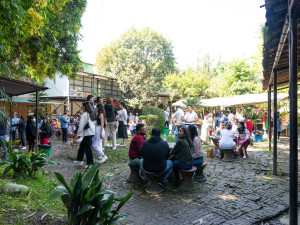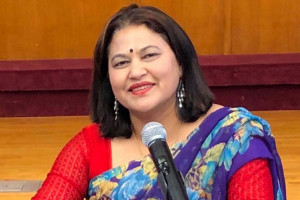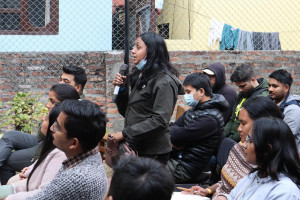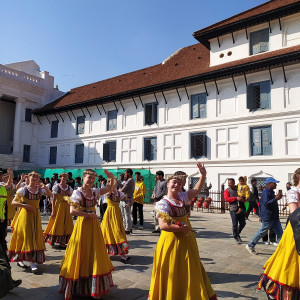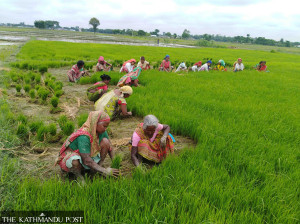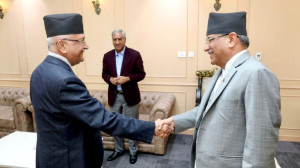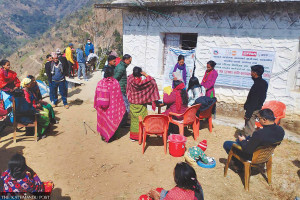 16.12°C Kathmandu
16.12°C KathmanduCulture & Lifestyle
Where deaf women display their handicraft skills
Kavre Development Association of the Deaf organises skill development programmes with the goal of making deaf individuals self-reliant.
Jyoti Shrestha
Some recently made bags are placed gently on one side. Sabita Nakarmi Manandhar, a resident of Banepa, is stitching garlands with pieces of fabric coloured red, blue, and green.
While stitching, she uses hand gestures to occasionally speak to her friends. Time and again, her gaze travels to her 2-year-old son playing by the door. She continues her work after stealing a glance at him. This is what it’s like inside the office space Kavre Development Association of the Deaf (KDAD) located in the district’s Banepa Municipality, Ward 9.
Manandhar goes to the association to learn skills almost every day. Her son is at work with her as his school is closed. She says that despite having a caretaker at home, she wants her son to always be with her, so he accompanies his mother to work. “To come to work and chat with friends is much better than to sit leisurely at home,” she says. “Time passes quickly when I work here.”
Manandhar has learned a handful of skills. She can make many things, like hats made out of wool, dolls, garlands, and more. Her hands are never truly free. Her husband, who also has hearing and speaking imparity, has supported her in this field. They both learned handicraft skills at the association. “My husband helps me out whenever he has the time,” she says.
According to her, she has been involved in various skill-learning programmes organised by the association over the past four years. In the past, she never received a proper opportunity despite having the will to learn skills at a young age. KDAD gave her the opportunity, and her family fully backed her up. She credits her family’s support as the chief motivator for her endeavours.
Now, making handicraft has become her source of earnings. “My greatest satisfaction in life is to earn doing what I do,” says Manandhar. She is happy with what she earns as it is sufficient to make a living and support the family if needed.
Like Manandhar, 23-year-old Khari Maya Jimba is also learning skills at the association. Beside her is a ball of yarn at a side and two knitting needles. She is making a hat. Just as the yarn is taking shape, the life of Kharimaya has also begun to take a new shape. There is an addition of energy and zeal in her life. For the past three years, she has been living in the hostel of Kavre School for the Deaf.
She is originally from Taaldhunga, which lies in Kavre’s Khanikhola Rural Municipality, Ward 5. She cannot hear or speak. Ever since childhood, she had a strong determination to do something on her own. But the belief that children with disabilities cannot make a living out of themselves stopped her in her tracks. As she grew up, her routine was limited to cutting grass and wood, looking after the livestock, and cooking in the kitchen. She used to feel lonely because of her inability to communicate. Moreover, she could not even receive an education.
Jimba’s brothers and sisters are also deaf. But they were taught to use sign language at Kavre School for the Deaf. Seeing her brothers and sisters communicate in sign language, she also wanted to learn it. But her family wasn’t supportive. Not giving in to their denial, she joined her brother and sister at the school. Through the school, she came across KDAD. There she got the opportunity to read, learn sign language, and develop new skills. Now, Jimba can sew, knit, and make a variety of things, including sanitary pads, keyrings, garlands, postcards, dolls, cushions, flowers, paintings, masks, and other handicraft-related items. “These skills have brought notable changes in my life,” says Kharimaya. According to her, skills help people with disabilities to lead a life of self-sufficiency. “By learning skills, one can move ahead in life,” she added.
Jimba’s routine is now dedicated to the world of handicraft. She has become an exemplary figure in her village. She says, unlike before, people now look at her with respect. “Those who used to shame us for being deaf are the same ones who are now praising our work,” she says.
30-year-old Rita KC, from Godavari, shares similar routines to that of Manandhar and Jimba. For over a decade, she learned how to stitch, knit, and make toys, cushions, bead necklaces made of crystals, garlands, postcards, embroidery, sanitary pads, and more. Besides making these products, she also teaches at the Kavre School for the Deaf.
KC decided that, instead of keeping all the skills to herself, she wanted to pass them on to other people, especially those who need them the most. She teaches in the afternoons, and keeps herself busy with handicraft in the mornings and evenings.
“The handicraft products made by the women of the KDAD are sold through online platforms,” says KC. “We also focus on the product’s marketisation. So they are getting good market coverage.”
She stresses the fact that learning skilful activities brings positive changes in the lives of people with disabilities. “Getting involved in such activities boosts confidence,” she says. Also, these activities give people the willpower to do something for themselves.
According to the vice-chairman of the KDAD, Sharmila Manandhar, the organisation has been continually conducting various skill-based trainings in the district to make those with hearing imparities self-reliant. “Women have been prioritised in these skill learning programmes. We’re still looking for programmes that the men might be interested in,” she says.





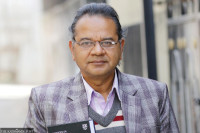

.jpg&w=200&height=120)




